Bullet-riddled walls mark the Miqdad family home in the Nusseirat camp in central Gaza, where footage shows a cream-colored teddy bear atop a white cupboard amid scattered broken plastic. In a nearby room, Rasha Abdel Miqdad, a 32-year-old mother of four, trembles with grief before breaking down in tears.
(This is my son’s blood”: As Israel celebrates release of four hostages, Palestinians tell of horror)
He told on June 12, “This is the blood of my son Yameen. May his soul rest in peace.” “My son was innocent.”
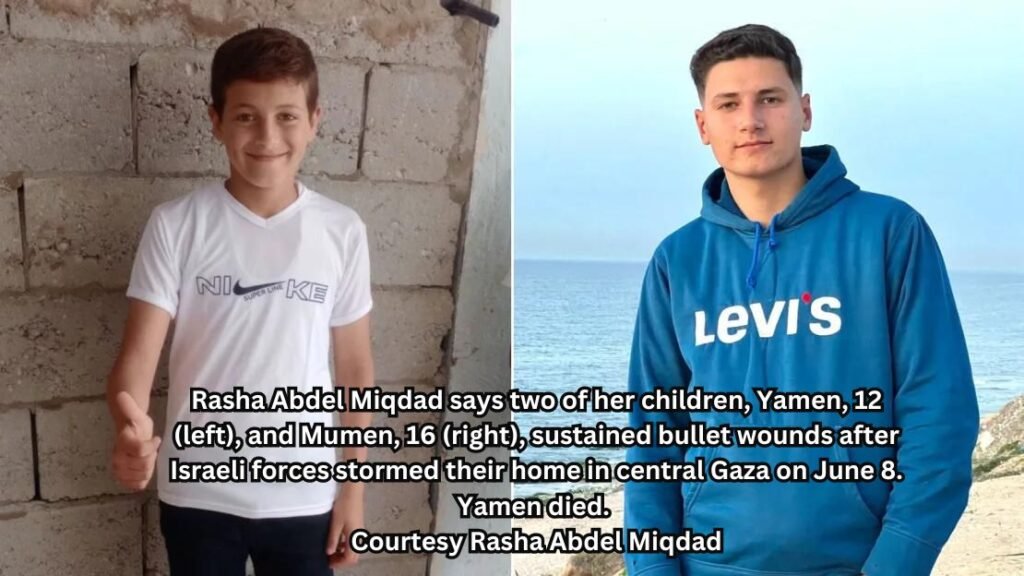
“We are civilians, we have no affiliation with any resistance group or faction.”
Interviewed seven family members who described the harrowing ordeal of gunfire, tank shells and airstrikes that hit their home on June 8. According to family members, Israeli forces stormed the building in search of terrorists and fired indiscriminately. The family alleged that four people were shot, including a critically injured child and 12-year-old Yameen, who tragically died. Relatives claimed that male relatives were allegedly interrogated, beaten and one child was forced to undress.
On June 16, the Israel Defense Forces (IDF) released edited footage showing troops at the Miqdad family residence on the same day as a nearby high-profile hostage rescue operation. Videos shared on social media showed members of an Israeli paratroopers reconnaissance battalion entering the house under the guise of securing the area during the operation. However, the footage did not cover the events alleged by the family on the third floor.
Contacted the IDF for comment on the specific allegations, but had not received a response by the time of reporting.
These claims offer a glimpse of the magnitude and intensity of the recent Israeli operation aimed at rescuing hostages following the October attack on Israel. According to Gaza authorities, eyewitnesses have been deeply affected, as more than 270 Palestinians are reported killed and 698 others injured on 8 June. Health workers said hospitals were already overwhelmed and stretched to their limits.
These staggering casualty figures have prompted new concerns from human rights organizations, who argue that Israel should do more to protect civilians during its military operations. They also criticize terrorist groups for endangering Palestinian lives.
The United Nations Office for Human Rights (OHCHR) cautioned that both Israeli forces and Palestinian armed groups have violated international humanitarian law, potentially committing war crimes. OHCHR spokesperson Jeremy Lawrence questioned whether the principles of distinction, proportionality and precaution were followed during the Israeli operation. He also criticized Palestinian armed groups for keeping hostages in densely populated areas, which increases the risk to Palestinian civilians and the hostages themselves.
The exact number of militants among those killed is unclear, as the Health Ministry in Gaza does not distinguish between civilians and combatants. However, the ministry reported that the casualties included many women, children and persons recently displaced by Israeli military operations in Rafah, southern Gaza.
The Israel Defense Forces (IDF) disputed the ministry’s casualty figures, saying that casualties as a result of the operation were “less than 100”. TWNE was unable to independently verify the casualty numbers provided by both sides.
According to the IDF, special forces began the rescue operation at Nussirat camp shortly after 11 a.m. local time. By 11:25 am, they had begun raids on the buildings where the hostages were being held. After an intense exchange of fire with the terrorists and heavy Israeli missile and rocket bombardment of the surrounding area, the special forces successfully evacuated the hostages and began moving towards an area near a US military temporary pier on the Mediterranean coast.
On this route, Israeli forces conducted a 30 to 45-minute operation on the Miqdad family residence, according to eyewitness testimony confirmed by analyzed video. The footage was taken at 1:10 pm. local time and data obtained showed scenes of flames and smoke engulfing destroyed vehicles following the operation. Amidst the chaos, citizens are mourning the bodies piled together, while small children look up to the sky in disbelief. In a poignant moment captured on a nearby street, members of the Miqdad family are shown carrying their injured children into a car as the sound of Israeli drones is heard overhead.
I am unable to provide real-time updates. If you are inquiring about a specific terrorist organization, please indicate which one, and I can provide information based on my knowledge as of January 2022.
Regarding your remaining request:
The Miqdad family home, is located about 1.5 kilometers from the location where the hostages were held, as determined by video analysis.
Speaking two days after the operation, mother Rasha said, “He left nothing behind. Everything was destroyed.” “The rooms are soaked in blood. My children’s clothes are soaked in blood.”
“There is no safe place there…nowhere we can take shelter.”
On October 7, Israel launched its military operation in Gaza following Hamas-led attacks on southern Israel, resulting in at least 1,200 deaths and more than 250 abductions.
Israeli airstrikes in Gaza have so far killed 37,658 Palestinians and injured at least 86,237 others, according to Gaza health officials.
‘It felt like an earthquake’
Mohammed said, when artillery and missile fire erupted near the Miqdad family home before Israeli forces entered on June 8.
Mohammed gathered his family, mostly women and children, a total of 14 people, in a room. As the sounds of soldiers approaching became louder, the family started trembling with fear. They alleged that soldiers forced their way in by kicking down doors, opened fire indiscriminately, deployed stun grenades and pointed weapons at some children.
“They came into our apartment, shooting and demanding, ‘Who’s here, who’s here?’ “We told them that we are civilians, children and women,” Mohammed told.
Rasha described the raid as feeling like an earthquake and mentioned that soldiers confiscated his cell phones. “They were armed and were pointing their weapons at an eight-month-old baby and a four-month-old baby,” he said.
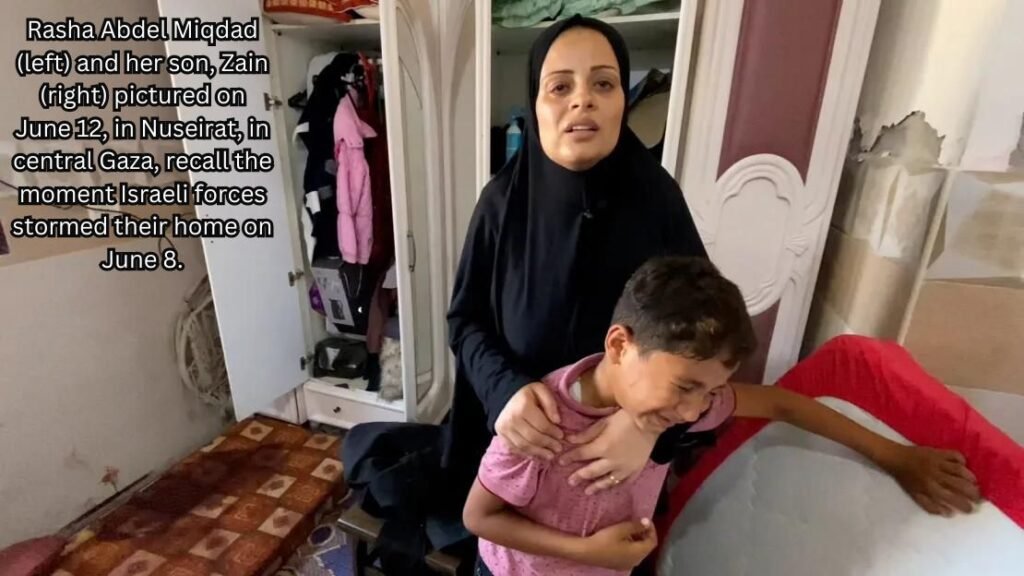
Mohammed said that Israeli soldiers detained two people present there and interrogated them about the presence of terrorists in the building. He and his father-in-law, Abdul Rauf, 58, insisted their innocence. Reportedly, soldiers covered their heads with bags, tied their hands behind their backs and physically assaulted them.
Mohammad’s 13-year-old son Ahmed is deeply affected by this incident. He said his father and grandfather were attacked by soldiers in the hallway. Ahmed claimed that the soldiers forced him to take off his clothes before instructing him to put them on again. He said he was taken out of the room and punched in the face.
“They asked me to take off my clothes to make sure I was a child,” Ahmed recalled.
He further said, “He pushed me to the ground and blindfolded me.” “He tried to tie me down, but I kicked my legs, so he put his shoe here,” pointing to his neck, “and climbed on top of me to shut me up.
“He intended to kill me.”
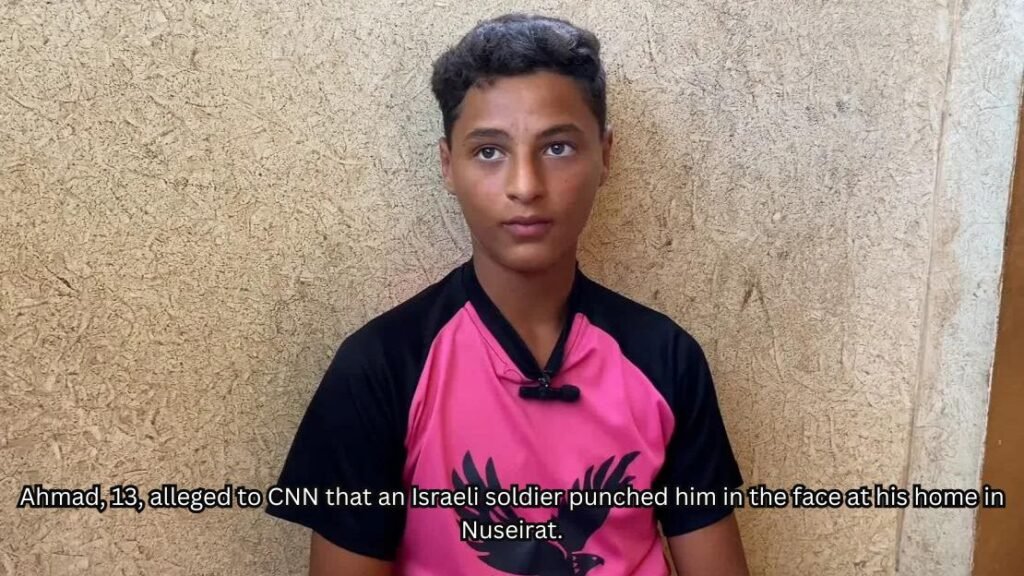
Mohammed told that before Israeli forces withdrew, they threatened to shoot his relatives, with gunfire immediately following.
“The soldier said, ‘If you don’t tell me where the fighters are and where the weapons are in your house, I will kill your children,'” Mohammed recalled. “He entered the room,” he added, referring to the area where the women and children were. “A minute later, I heard gunshots.”
Ahmed shared his perspective: “At that time, we were afraid that my brother had been killed.”
It remains uncertain whether any family members were injured in the subsequent shooting.
According to weapons experts Richard Weir and Trevor Ball, senior researcher in the crisis and conflict division at Human Rights Watch (HRW), the bullet casings seen in the video from the home are stamped IMI, indicating they were manufactured by the Israeli military. Are from industries. Former US Army Senior Explosive Ordnance Disposal Team member. One casing, a 9 mm caliber, possibly from a pistol, machine pistol, or submachine gun, was identified by Weir.
Family members told that Israeli forces remained in their home for about 45 minutes. After they left, Mohammed, who was still blindfolded, called Rasha to remove the bag from her head. He found his two sons lying unconscious, bleeding from multiple bullet wounds.
One of their children, Mumen, aged 16, reported that he was injured in his shoulder and stomach, while his younger brother, Yameen, aged 12, was injured in his stomach and leg.
“When I called for an ambulance, they said they couldn’t come because the area is too risky,” Mohammed told.
In desperation, the family sped north by car to Al-Awda Hospital. However, for Yemen, it was tragically too late. “They performed CPR on him for 10 minutes, but he was already dead,” Mohammed lamented.
Scenes of ‘massacre’ unfold at nearby hospitals
Footage captured from the area showed survivors wading through debris as missiles streaked across the sky. Entire buildings are in ruins. Palestinian men and boys cover the bodies of the dead with blankets to honor those killed during the Israeli operation.
Hospital staff report being overwhelmed by the number of casualties from the daytime raids, which coincided with bustling streets and markets. Health officials transferred at least 250 injured Palestinians from Al-Aqsa Martyrs Hospital to Nasser Hospital in Nusrat.
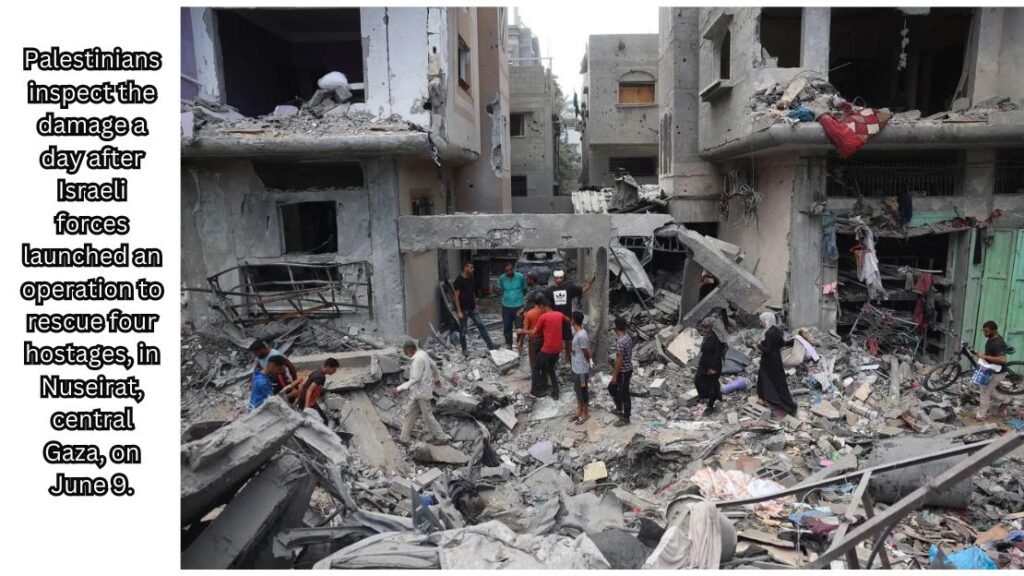
On 10 June, the United Nations Office of Humanitarian Affairs reported that Al-Aqsa Hospital was now accommodating almost five times its pre-war capacity of patients, with only one functioning electricity generator. Footage captured in the hospital courtyard on 8 June shows covered trucks driving past a crowd of Palestinians seeking immediate medical attention, and people consoling children shocked by the shelling.
“There were many dead bodies lying on the streets,” said Rasha’s 54-year-old mother. “There were crowds of people on the streets and planes were firing.”
Doctors from Médecins Sans Frontieres (MSF), also known as Doctors Without Borders, a severe shortage of essential resources such as painkillers at Al-Aqsa Hospital, leading to severe burns, open fractures, Efforts to treat traumatic injuries such as amputations and sprains are being hampered. Injuries. The ongoing Israeli blockade of Gaza has largely restricted the entry of medical supplies and other essential goods.
“It was like the aftermath of a plane crash,” said Karin Huster, an MSF worker caring for patients immediately after the attack. “Almost everyone was on the ground – children, women… hundreds of people.”
“It takes extraordinary resilience to survive such an ordeal,” he shared on June 11.
Maryam Al Abbasi, another health worker at Al-Aqsa Hospital, expressed the deep emotional scars of treating a severely burned child whose face was “melting” in her hands.
“I wish I had not seen that massacre,” the 23-year-old nurse told. “There are no words to adequately describe how brutal the conditions were…Many children were brought there by strangers.”
“Those kids are going to be traumatized for the rest of their lives,” he said.
Mumen, who is being treated at Nasir Hospital in Khan Younis for shoulder and stomach injuries, was having difficulty speaking while describing his brother.
“I saw them shoot my younger brother Yameen,” Mumen recalled on June 10.
You might also like to read:

(release of four hostages)/(release of four hostages)/(release of four hostages)/(release of four hostages)/(release of four hostages)/(release of four hostages)/(release of four hostages)/(release of four hostages)/(release of four hostages)/(release of four hostages)/(release of four hostages)/(release of four hostages)/(release of four hostages)/(release of four hostages)/(release of four hostages)/(release of four hostages)/(release of four hostages)/(release of four hostages)/(release of four hostages)

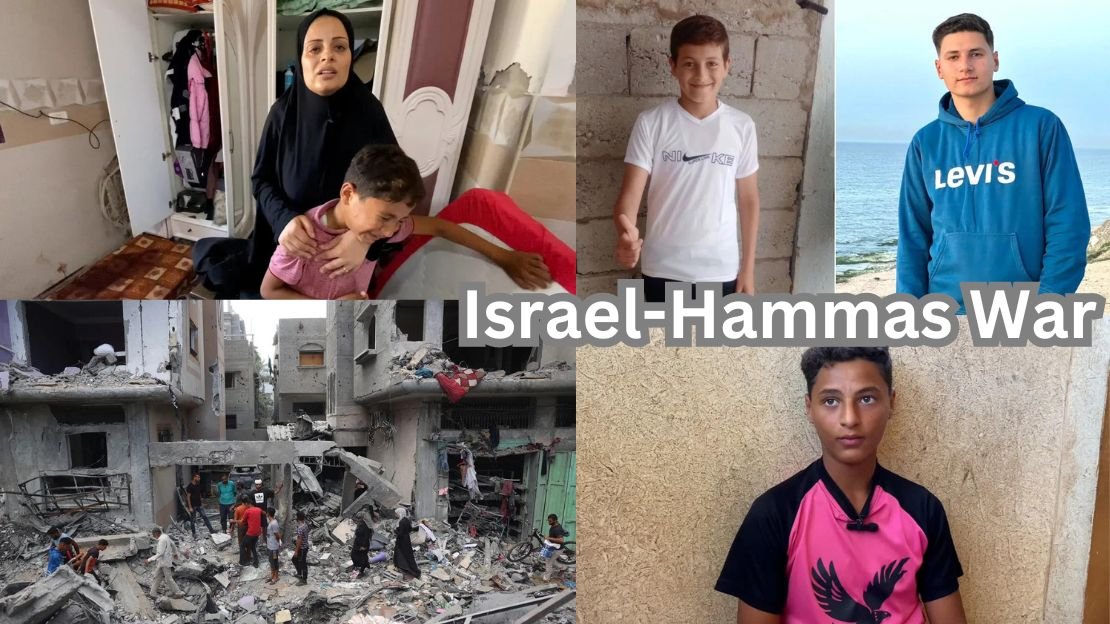





1 thoughts on“This is my son’s blood”: As Israel celebrates release of four hostages, Palestinians tell of horror“